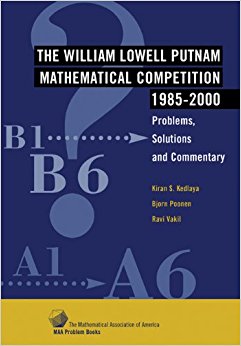MAT 260: Problem Solving in Mathematics
About the course
Summary. This course is intended for students preparing for the Putnam exam, a competitive national mathematics exam for undergraduates which is held each December. Students actively solve challenging problems in plane geometry, basic number theory, and calculus, and write precise arguments. Relevant preparation for problem-solving is provided in the course.
Grading. Grades will be based primarily on class participation and effort in solving problems. There is no final exam and no fixed homework, but you are expected to try your best to solve some of the problems offered for next week's discussion. Familiarity with basic concepts of analysis, algebra, and geometry is assumed — please consult with me if you are not sure about your background.
Books. For the most recent collection of Putnam problems, check out The William Lowell Putnam Mathematical Competition 1985-2000: Problems, Solutions, and Commentary, by Kiran Kedlaya, Bjorn Poonen, and Ravi Vakil, available online for example from this link. Another very useful book is Putnam and Beyond, by Razvan Gelca and Titu Andreescu, available online from this link.
Time and location
We meet on Monday afternoon from 4:00–5:20 pm, in Earth&Space 183. My office hours are Monday, 10:00–11:00 and Thursday, 10:00–12:00; my office is Math Tower 3–117.
Putnam Competition 2017
This year's William Lowell Putnam Competition will take place on Saturday, December 2, 2017, from 10am to 1pm and from 3pm to 6pm. The deadline for registration is October 15, 2017. If you are interested in participating, please talk to me.
Policy Statements
Disability Support Services. If you have a physical, psychological, medical or learning disability that may impact your course work, please contact Disability Support Services, Educational Communications Center Building, room 128, at (631) 632-6748. They will determine with you what accommodations, if any, are necessary and appropriate. All information and documentation is confidential. Students who require assistance during emergency evacuation are encouraged to discuss their needs with their professors and Disability Support Services. For procedures and information go to this website.
Academic Integrity. Each student must pursue his or her academic goals honestly and be personally accountable for all submitted work. Representing another person’s work as your own is always wrong. Faculty are required to report any suspected instances of academic dishonesty to the Academic Judiciary. For more comprehensive information on academic integrity, including categories of academic dishonesty, please refer to the academic judiciary website.
Critical Incident Management. Stony Brook University expects students to respect the rights, privileges, and property of other people. Faculty are required to report to the Office of Judicial Affairs any disruptive behavior that interrupts their ability to teach, compromises the safety of the learning environment, or inhibits students’ ability to learn.
